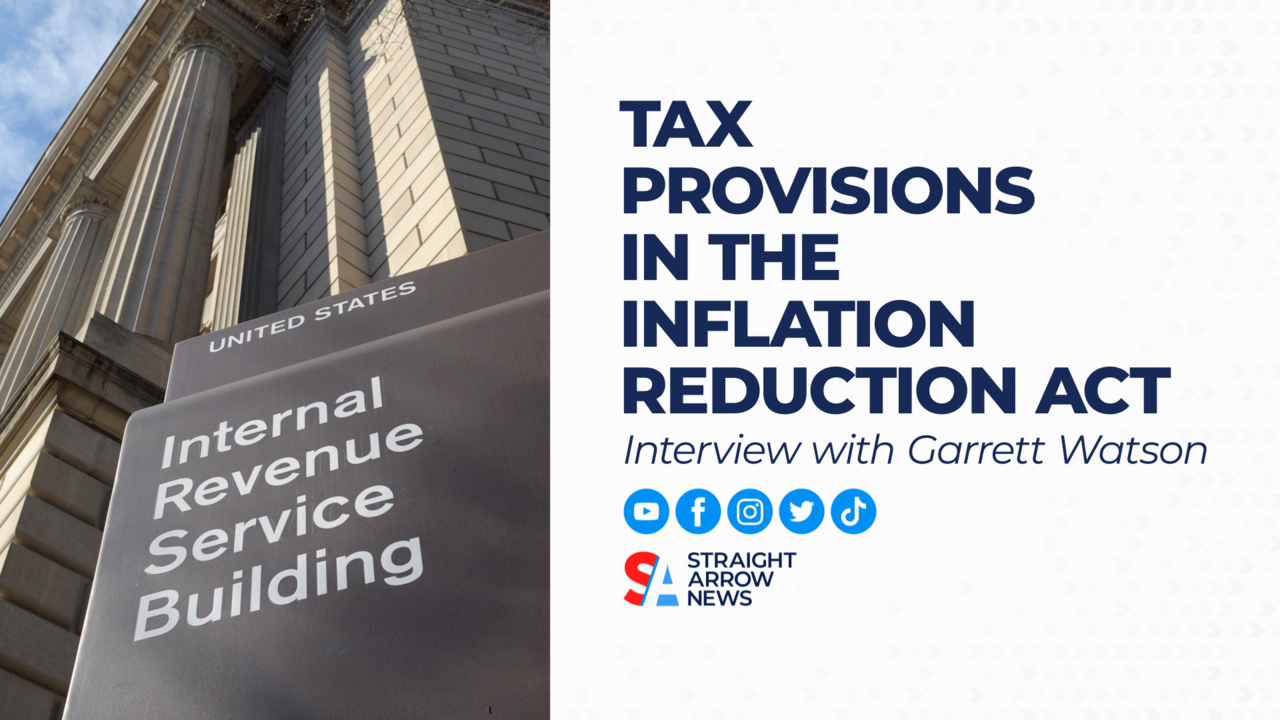
President Biden signed the Inflation Reduction Act into law Tuesday, finalizing his signature piece of legislation just before the midterms.
The bill provides $369 billion for clean energy investments, $64 billion for Affordable Care Act premium subsidies, allows Medicare to negotiate drug prices and caps out of pocket costs at $2,000 per year. Democrats said all of that will be paid for while providing $300 billion in deficit reduction. How? Through changes to the tax code.
Straight Arrow News discussed the many tax provisions in the bill with Tax Foundation senior policy analyst Garrett Watson.
Ray Bogan
So first and foremost, I want to ask you about the impacts this could have on individual taxpayers. Specifically, President Biden’s campaign promise of never raising taxes on people who make less than $400,000 a year to pay for his policies. The White House put out a letter from Treasury Secretary Janet Yellen that states, “The legislation would either reduce or have no effect on the taxes due or paid by any family with income less than $400,000.”
Based on your analysis, is that true?
Garret Watson
So we find that the bill does aim primarily at high earners and corporations, in terms of who is actually remitting that tax. Especially when you look at taxes like tax on buybacks for stocks, as well as a minimum tax on corporate income. So overall, when you take that and you weigh it against the expanded health care subsidies, the energy credits and other provisions in the bill, we find that the incomes of most taxpayers on average would go up over the next 10 years overall. However, it is important to point out that those tax increases will have a negative impact on workers and shareholders in the long run. And that includes everyday Americans, because people pay taxes, not corporations.
Ray Bogan
Your team wrote in your analysis – we estimate the Inflation Reduction Act would reduce long run GDP by about .1%, reduce wages by .1%, and eliminate 30,000 full-time equivalent jobs. Now, .1%, obviously, is not that much in the grand scheme of things. But regardless, when it comes to a bill that was specifically written with the idea of reducing inflation and boosting the economy, how can it have a negative impact on three of the most important economic indicators?
Garret Watson
Right, so what we’re looking at there is the long-run effect on the economy where every year the economy is smaller than it otherwise would be. I think the other thing we found was that, in terms of inflation, there are two effects. One is raising taxes in the short run may have a dampening effect on inflation, though we find that deficits may actually increase in the first couple of years really depend on how much tax revenue comes in from these higher taxes. If it’s less than, than the Treasury Department expects, it could actually end up stoking some inflation, albeit minorly. And then in the long run, we’re gonna see a less productive economy, which is definitely not going to help when it comes to prices after these taxes fully take effect.
Ray Bogan
The bill provides tens of billions of dollars over the next 10 years for the IRS to hire an estimated 86,000 new employees who will do everything from audits, to IT, to customer service. For the average taxpayer, could they feel any impact from that whether it’d be positive or negative?
Garret Watson
A big part of this increased tax and tax enforcement for the IRS coming in the form of about $80 billion of additional IRS funding and hiring up to 70,000 different IRS workers over the next 10 years is to try to focus a lot of their attention on those earning over $400,000 a year. There’s some language in the bill that explicitly says this and IRS Commissioner Reddick has suggested that he would focus on the top, but bottom line is there’s no way to guarantee that. And it’s almost certain that folks under that $400,000 line will see some impact in the form of closer audits. And in addition to items like IT modernization and additional resources for customer service. And I think it’s really important in addition to this enforcement discussion, which folks are rightly worried about, that we prioritize the customer service and the helpfulness of the agency, in addition to the part of the agency that works on enforcement. And that comes in the form of making sure taxpayers can actually get a hold of someone. We’ve seen 10% rates of folks trying to get a hold of someone, 90% of the time they don’t get a hold of anyone. That’s just unacceptable.






